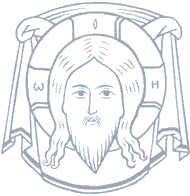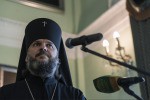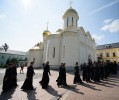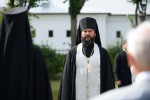 |

|
||||||||||||||||
Ты Бог мой! Музыкальное наследие священномученика митрополита Серафима Чичагова
[Автор-составитель: О. И. Павлова; Автор-составитель: В. А. Левушкин]
07 сен. 2016 г. Физическое и духовное здоровье: по "Медицинским беседам" Леонида Михайловича Чичагова
[сщмч. Серафим (Чичагов)]
10 мая. 2016 г. |
Archbishop Ambrose: I’ve returned home
01 сентября 2018 г. Your High Reverences and Reverences, venerable professors and teachers, dear students, brothers and sisters! I'll start with simple, but very personal words: I’ve returned home. Being a graduate of the Moscow Theological Academy, with a very special feeling and in a new capacity I cross the doorstep of my home after 18 years. In such moments, it is not so difficult to understand the feelings of Odysseus, who after a long voyage returns to Ithaca “filled with time and space”. Indeed, these 18 years of voyage for me were filled with meetings with amazing people and encounters with unforgettable places. I am deeply grateful to every person and place, everyone and everything has left its mark and changed me in some way. As I said, bidding farewell to the students of Saint Petersburg Theological Academy, “I do not know if I was able to teach you anything, but you’ve taught me a lot”. I sincerely hope that this modest experience acquired by me will allow me to be useful now and for my dear home. My main words today are of course addressed to the students. To those for whom we’ve gathered here. To those for whom the Academy exists. The Theological Academy is first and foremost a school that, with the right approach, is able to give you a colossal positive life experience. One of the main points of this experience is the art of appreciating what truly deserves to be appreciated. First of all I'm talking about the greatest gift given by the Heavens to the humanity – time. Learn to wisely control the use of the time that is given to you within these walls, and this will help you to properly control the use of the time that is given to you in this world, in this life. It's true: due to an abundance of lectures, obediences, and self-preparation students sometimes do not have enough time. And thanks to such daily fullness of events, time becomes very special, concentrated. At first it seems complicated. It seems that it is impossible to do and study anything beyond what the theological school offers. And it seems difficult to follow even the programme of the Academy. Accept this life challenge of the schedule of the Academy as a space for nurturing the skills of self-organization. Learn to plan, set goals and achieve them. Learn to do more than what is required of you by the schedule and your mentors. Schedule, rhythm and workload are only the conditions of growth, as a support for a young tree. The support limits the plant, but thanks to it the tree grows slender. One day the walls of the Academy will no longer surround you, but the abundance of pastoral, family and civic duties and concerns will grow steadily, like an avalanche. And so as not be once buried under the collapsed mass of this stream, right now begin to strengthen your consciousness by self-organization and a gradual increase of the workload. I consider it necessary to say that the Academy is primarily a space for studies. The educational process should take the main place among other aspects of the life in Academy. In order to be just a good Christian you do not need to learn so much and to know so much. But a Christian who wants to make a meaningful contribution to life, and this is what priests and ministers of the Church should do, must be perfectly educated. As Metropolitan Anthony of Sourozh told the young priests of London: “you have to choose – either to be an ignorant and saint, or to be a well educated person; but while you're not a saint, please be an educated person, because otherwise it turns out that on the questions that a person has the right to receive an answer you cannot give any neither due to holiness nor due to education”. The priests should have the broadest outlook. And you can only acquire it personally. Because people will come to you with questions about what to think about the modern book, about the film, about the aspects of public life. And you must give an answer. An independent answer, not just taken from other theologians, media priests or other opinion leaders. Such answers can be easily found on the web without you. And in order to have your own strong opinion – you have to read, watch and penetrate, reflect and write down your own thoughts, to comprehend these phenomena as Christians. Far behind are those days when the very presence of the ryasa guaranteed a certain credit of sympathy and trust. Now our interlocutors look deeper into our content. And they are waiting for the content both spiritual and highly intelligent. They expect depth from us. Find inspiration in studies. In general, the opportunity to learn something new is an inexhaustible source of inspiration, so we are created, so for us by God is created the world – the book opened before us. The more sciences you study, the more you will be able to read, understand and explain to the others this book from different sides. The greater meanings you would be able to open every time. Therefore, I beg you: take as much effort and have as much focus on your studies as possible. And all of us, the administration, teachers and staff will try to create such conditions that you can receive knowledge without any obstacles. Priests are not only ministers of the Word with a capital letter, but also of the word with a small letter. The word is the surest instrument of the Church from the apostolic times. In the modern world, the ability to correctly and competently work with a word is not a luxury of the elect, but a vital necessity for each and everyone. I especially emphasize the importance of the ability to write texts in my very first address to the Academy. Because the text is order, organization and meaning. It is necessary to study to write it, this skill is not so much dependent on inspiration, as it is commonly believed, how much from perseverance, practice of working with the text, studying the principles of its work. After all, from how well you learn to work with the text, it depends whether you will be able to convey the meaning to people or not. Either way, our ministry will be to preach Christ in this world. And in order to learn this, it is vitally necessary to practice the art of translating the heavenly truth into the language of the earthly truth, turning the infinite phenomena into the finite language. Of course, it's harder for ones, and easier for the others. But in this art you need to have a tenth of talent and nine parts of zeal and daily work. The boundaries of my language are the boundaries of my world. Order and clarity in the presentation of thoughts is nothing more than an external manifestation of the internal order of reason and clarity of feelings. In written texts, rhetoric has the same strict laws as has music or architecture. It is not for nothing that the brightest stars in the Church horizon of the fourth and fifth centuries are called by the modern patristics theologus rhetoricus, i.e. theologians-rhetoricians, because the laws of rhetoric were for them not only the art of eloquence, but also the art of thought. In the Moscow Theological Academy, we are called to learn how to follow the Great Fathers not only in the art of prayer, but also in the equally noble art of thought and speech: oral and written. Therefore, practice writing texts not only when you are required to do so. Write diaries. Write down your thoughts. Write essays and fiction texts and I will gladly read them. Reading books analyze how they are written by the author and why he uses exactly these words and such a structure. Try to notice these things, hidden from an unsophisticated view. This will make you deeper, this will fill you with special content. This will help us better understand each other. The Russian Church of tomorrow will like air need priests who have a broad modern outlook, who can strategically think and make sensible and informed decisions, accustomed to think and analyze, bold and ambitious in their goals and adamant in their implementation. You are going to be these priests. Therefore, all these goals are now before each and one of you, they cannot be ignored. A person who will learn how to organize himself here will be able to organize a family, a parish, a diocese. Because all these things work according to the same rules. But you can only learn to organize someone if you are able to organize yourself. Organization begins with trivia: with the ability to wake up half an hour earlier, with the rules of hygiene, athletic activity, clean hair, neat clothes, a tight and slender figure. With the ability to organize your appearance and neatness. In general, untidiness tells about laziness, looseness. We are not like that. We are called to holiness, and holiness doesn’t go along the way with laziness. At the same time, the intellectual principles should not, in any case, displace or eclipse the spiritual ones. In a harmonious person, all parts should be developed simultaneously. The Theological Academy is the way of becoming a priest, a clergyman, a person ready to devote his life to serving God. Each of us is called upon to be first and foremost a point of special contact between the heavenly world and the earthly world. For that the minister of Christ must possess not only a corresponding intellectual content, but also a deep inner content. We are filled with this content primarily in our personal prayer. And prayer is also an activity that must be practiced, in order to make progress in it. Prayer is also a practice, a deeply personal practice, like all creativity. Inure yourself to be alone with God. Select the regular time for this. Turn inward, do not dissipate into anything else. Concentrate. Speak with the Creator: address and listen to His answer. It is impossible to fill yourself spiritually without a connection with God in the sacrament of the Holy Communion of His Body and Blood. Communion is what each Eucharist should be crowned with. A priest does not have the right to serve the Liturgy and not receive Communion. You came here to become priests. Think about what your participation in the Divine Feast should be, to which the Only-Begotten Son of God invites all of us. This decision is to be made by everyone independently, but remember that we are serving the Divine Liturgy in order to receive Holy Communion. Not for singing. Nor for the sake of the rite. But only for all of us to unite with the Risen Lord and each other. Only to eat His Body and drink His Blood, and through this to reach the eternal life and be risen on the last day (cf. John 6:54). So do not look for excuses in your own unworthiness to approach the Divine Chalice. Yes, we are not worthy of it. And none of our efforts will make us worthy to unite with Christ. Only He Himself, and none of our, even the most important and right human efforts, calls us at every Eucharist to receive His Body and Blood, and makes us worthy. And only He is able to make us one family and to communicate the true experience of that we are all brothers and sisters, equal children of Heavenly Father. All hierarchical and administrative differences are nothing but an earthly necessity to arrange some kind of order in our life. And this is not the right to look haughtily from the top to the bottom, but the heavy responsibility for others. Responsibility of the elders for the younger. I sincerely hope that all of us – teachers, students and employees – Christ will always see at the Divine Liturgy gathered around one Chalice. We, gathered here today – are a family. Great family of the Academy. And it's not just beautiful words. After all, the communion of the “Immortal Table, in the upper room, that is, in elevated minds” is capable no just nominally, but really make us something much more than just a group of people who have found themselves in the same place and at the same time in different fates. I am sure that the presence of each of us here is deeply providentially. We are a family, which means that respect for each other – teachers and administration representatives to students, students – to their mentors should be a cornerstone and a law that must be obligatory for everyone. The family cannot exist without special respect for the elders and love, especially for the younger ones, who always need more help and attention. Dear students, as far as I can in my power in such a huge organism as our Theological Academy, I will always try to be open to you, to hear your aspirations, problems and creative suggestions. Not only in the office, but also on the way from the building to the building, during the walk. You can always turn to me when there is an inner need for it. Together we will determine the way of communication of each of the courses with the rector. I will try to be more often in your life. I will try to be a good father of our big family. In conclusion, I would like to tell you that youth is happiness. The second youth, a period of a special flowering of strength and feelings, you will never experience. And so dare, create, live fully, develop comprehensively. Bright, free and vivid – this is the way the Creator, the Mother Church needs you, we all need you. I hope for your strength, energy, your creativity and your ideas! Together we have a lot to do, confidently going forward together. Do not be afraid to overtake those who are slow and timid in the Church. The Academy needs your energy, intuition and faith. Do not judge us, the older generation, for low mobility; you are much faster than us, and the dreams of the young are always a bit frightening for the adults. Be bold. Take risks for the sake of Love. Turn your dreams into the reality of tomorrow. Combining our life experience and the power of your dreams, we are capable of great things, you just need to believe. I believe in you, in each of you, as I believe in the fact that the future yours. Do not deceive this faith, be worthy of it. Use all the forces and all the time that is given to you within these walls to become tools through which the Lord pours out love into this world. And most importantly, remember that the way of a Christian is a path in rejoice. Smile more often to each other, do not forget to greet everyone you meet at the Academy: be it teachers, staff keeping a clean room or unfamiliar guests. Give your joy and warmth to other people. Look closely, one of your brothers at this very moment is cold and under burden, support him together. Forgive others their mistakes and pray for one another, and for us, who by the will of God have become your mentors. Love each other. And may God bless all of us for the great and good deeds in the coming academic year. |
15 февраля 2019 г.
15 февраля, в двунадесятый праздник Сретения Господня, архиепископ Амвросий совершил Божественную литургию в семинарском храме преподобного Иоанна Лествичника. На праздничном богослужении владыка ректор рукоположил студента МДА и сотрудника Учебного комитета чтеца Иоанна Захарова в сан диакона.
15 февраля 2019 г.
Издательство МДА представляет первый номер нового научного журнала Московской духовной академии «Праксис». Журнал объединяет публикации, соответствующие паспортам научных специальностей ВАК 26.00.00 (Теология) и 12.00.01 (Теория и история права и государства; история учений о праве и государстве), и охватывает такие предметы, как каноническое право, литургика, пасторология, юридические науки, педагогика и т. д.
14 февраля 2019 г.
13 февраля 2019 года в Отделе внешних церковных связей состоялось заседание Межведомственной координационной группы по преподаванию теологии в вузах. В заседании принял участие ректор Московской духовной академии архиепископ Верейский Амвросий.
13 февраля 2019 г.
12 февраля в Большом актовом зале Московской духовной академии состоялась премьера фильма «Чудотворец» с презентацией профессора ВГИКа Станислава Михайловича Соколова, режиссера-постановщика картины.
Архиепископ Верейский Амвросий (Ермаков) [Статья]
Архиепископ Верейский Амвросий (Ермаков) [Статья]
Игумен Пантелеимон (Бердников) [Проповедь]
Чтец Сергий Палий [Проповедь]
Чтец Андрей Мачак [Проповедь]
|
||||||||||||||||||||||||||||||||||||||||||||||||||||||||||||||||||||||||||||||||||||||||||||||||||||||||||||||||||||||||||||||||||||||||||||||||||||||||||||||||||||||||||||||||||||||||||||||||||||||||||||||||||||||||||||||||||||||||||||||||||||||






